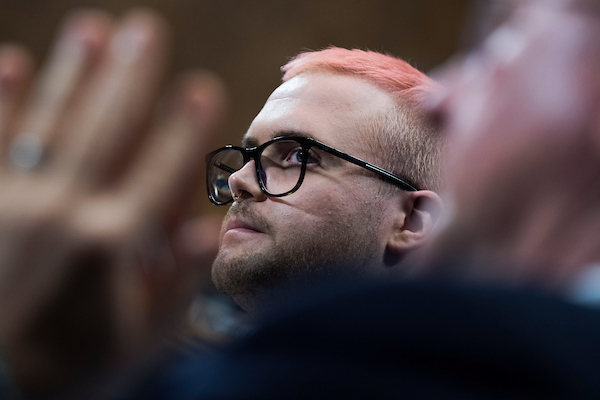‘The Great Hack,’ Cambridge Analytica and our blurred reality
Political Theater, Episode 84

How do you make a story about data privacy interesting? That was the challenge of the documentary “The Great Hack.”
Filmmakers Karim Amer and Jehane Noujaim set out to chronicle the Cambridge Analytica scandal, in which millions of Facebook users had their personal data compromised to influence the 2016 election.
On the latest Political Theater podcast, Amer said he and Noujaim started out thinking about “this idea that there’s my digital life, and then my physical life, and I have a clear border as to where one begins, and where the other ends no longer really existed anymore.”
But can what he describes as our “blurred reality” be a movie? When you tell this kind of story through characters like former Cambridge Analytica executive Brittany Kaiser, who went from volunteering for Barack Obama’s 2008 campaign to being a conservative political operative speaking at CPAC, and David Carroll, a Parsons School of Design professor who sued Cambridge Analytica to get his data back, yes.
The movie, shown through their perspectives — as well as that of others like journalist Carole Cadwalladr and another former Cambridge Analytica employee, Christopher Wylie — unfolds like a Bond movie. There are locales that stretch from London to Thailand, glamorous and shifty villains, heroes and heroines whose motivations are not always clear and, you know, the fate of freedom and the democratic process.
Kaiser’s narrative is especially important in making the documentary compelling. A Democrat who went on to pitch the campaign of Donald Trump on using Cambridge Analytica data, and then eventually became a whistleblower, she is as complicated as it gets in the story.
“I think that she leaves us with a lot of questions,” Amer says. “But what’s important to remember about Brittany’s story is that it’s a window into allowing for redemption to happen as well. And I think that that’s an important message in America today. If we want to fix the system, we need people on the inside to come forward. And if we cast them away, because of their political sides, then we’re never going to understand what’s happening.”
Amer and Noujaim have seen how politics can go truly sideways. Their 2013 film “The Square” was about the Arab Spring, and how the optimism of that moment in history quickly unraveled in Egypt amid a brutal crackdown in Cairo’s Tahrir Square. It was an on-the-ground and up-close chronicle of a revolution and its violent aftermath.
“The Great Hack” tackles a more abstract concept of politics, but one no less important. Amer says “The Square” and the Arab Spring showed how social media could be an agent for positive change, and Silicon Valley rushed to embrace that. But now that more insidious forces like ISIS have social media strategies, and firms like Cambridge Analytica harvest data to manipulate politics, “I don’t see that there is a willingness for them to step in and fix the problem. And that concerns us because I think that it’s important to remember that Silicon Valley is standing on the shoulders of the open society.”
It is the fate of that open society that the film is preoccupied with, and makes it worth watching and discussing.
Show Notes:
- Facebook incurs wrath from both parties at Libra currency hearing
- Facebook’s Lobbying Team Faces Test With Zuckerberg on Hill
- Senators Face Off With Zuckerberg in Marathon Hearing
- The gigantism of big tech forces a fresh look at antitrust
- Many Lawmakers Questioning Zuckerberg Used Facebook in Their Political Campaigns
- The Real Facebook Scandal
- Ro Khanna Writing Internet Bill of Rights





